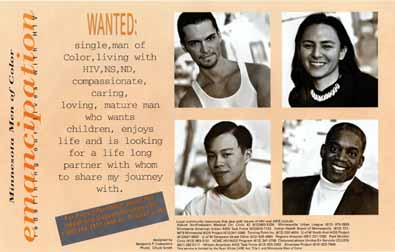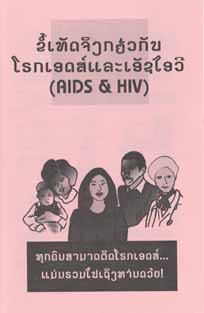Difference between revisions of "Minnesota Men of Color"
m (Protected "Minnesota Men of Color" [edit=sysop:move=sysop]) |
m (Unprotected "Minnesota Men of Color") |
(No difference)
| |
Revision as of 15:01, 31 January 2012
1433 East Franklin Avenue, Minneapolis, MN
| Minnesotan people of color exist within a societal structure that continues to garner European descendants with unequal privileges.
|
Minnesota Men of Color poster. Part of a campaign funded by the Ryan White CARE Act. Courtesy of the Jean-Nickolaus Tretter Collection. |
The civil rights act of 1968 made the practices of redlining and restrictive housing covenants illegal. By that time, the “Gay Ghettos” of Minneapolis and St. Paul already established near Loring Park and Grand Avenue—once exclusively-white areas. This geographic separation and other economic disparities led to a divide between white and nonwhite queer communities.
| Laotian pamphlet with HIV/AIDS information from the New York Department of Health. Minnesota Men of Color networked with other groups across the nation and shared materials with them. Courtesy of the Jean-Nickolaus Tretter Collection. |
In 1999, Nicholas Metcalf founded Minnesota Men of Color (MMC) while finishing Graduate School and raising a child. The organization—serving the “Arab/Middle Eastern, Asian Pacific Islander, Chicano/Latino and Native American Lesbian, Gay, Bisexual, Transgender (LGBT) population in the state of Minnesota”—focused a sizable proportion of its attention to HIV/AIDS services."(1)
|
MMC, which disbanded in 2009, was among the first organizations to specifically invest time and resources to queer people of color.
(1)Acain, Angeline. " Yellow Hawk and the Child of His Heart: An Interview with Nicholas Metcalf." Gay Parent Magazine, 2002. http://www.gayparentmag.com/11323.html
(2) Ibid.
(3) Ibid.
Part of Minneapolis/St. Paul, MN: 100 Queer Places in Minnesota History, (1860-1969), (1969-2010)

